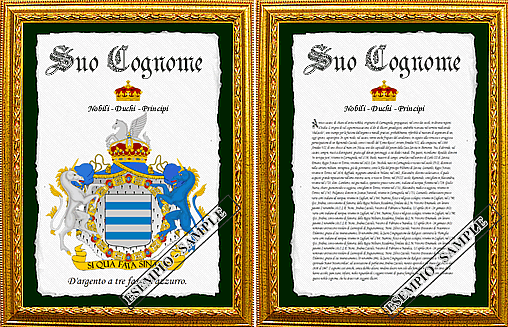Extremely rare it is of Catalan origins, it is a noble Aragonese family that came to Cagliari and took up residence there, held the marquisate of Laconi (NU) since the 15th century, the Visconti of Sanluri (CA), the barony of Ploaghe ( SS) etc. In 1470 the King of Spain Giovanni d'Aragona granted Pietro Aymerich the post of consul of Sicily. additions provided by Giuseppe Concas AYMERICH: it is clearly not a Sardinian surname, but has its greatest diffusion in Sardinia (nationally), since ancient times. We do not know its exact meaning and etymology, but we believe it derives from the name Amerigo. The Aymerich of Sardinia belong to an ancient lineage, of the bourgeois class of Castel di Cagliari. Their first presence in Sardinia and exactly in Cagliari dates back to the mid-fourteenth century (they were Catalan merchants, probably from Barcelona; they were mainly interested in trade). In the 15th century they became one of the most powerful families in the city. They extended their commercial traffic throughout the Western Mediterranean. In 1486 they bought the Lordship of Mara, elevated to County in 1641. Their first noble title dates back to 1521, for investiture of Charles V emperor. During the XVIIth century the Aymerichs came into possession of the fief of Villamar, of the marquisate of Laconi, of the barony of Plaghe, of the viscontado of Sanluri (Di. Sto. Sa. Di FC Casula). We do not find the surname in the Condaghi, among the signatories of the Peace of Eleonora of 1388, in the Carte Cagliaritane, but, in the work "De Rebus Sardois IV °" (of) Ioannis Francisci Farae - (pag. 234 cv. 10- 28) , we find: "Anno deinde 1481 coniuncto insulae Sardiniae et Siciliane reign Aragoniae.in Calaiutana urbe (Calatayud - currently around 18 thousand inhabitants - capital of the homonymous Comunidad - of the autonomous region of Aragon - north east of Spain, not far from the Pyrenees). eodem year Eximen Peres prorex Sardorum (Ximen Perez viceroy of Sardinia), conventus, quos parlamentum appellant, in Castro Calaris habuit, paesentibus Petro Pilares, archiepiscopo calamitano, Ioanne Fonesa, Iacobo Maraquis, Ioanne Fabra, Andrea Sunyero, Francisco Zunquello, Petro Martino de Ferrariis, Berengario Granello, Ioanne Rodo, Ioanne Andrea, Petro de Cervello, Petro Fortesa, Galcerando Iuliano, Petro Mara de Lacana, Salvatore de Sena, Ludovico Castelv ', Iacobo Aragall and Petro Gomes praesulum, magnatum and t civitatum (representatives of the various city categories), necnon (and also) Arnaldo Roca, Bernardino Margens, Ioanne Nicolao Aymerich, Antonio Martino and Antonio Aymerich Calaris consulibus (Cagliari consuls) ". . Separately from the Aymerich of Cagliari, in the history of Sardinia we remember Amerigo Nicolò Aymerich, bishop of the Diocese of Bosa from 1351 to 1355, during the war between the Giudicato of Arborea and the Catalan Aragonese kingdom of Sardinia. The documents of the diocese of Bosa are native of Mallorca. He had many engagements with the Roman Curia, therefore he cared only for the Diocese. There are numerous Aymerichs that have marked the medieval and modern history of Sardinia. We of Medio Campidano remember Msgr. Aymerich Michele Antonio, bishop of the diocese of Ales Terralba from 1788 to 1806, son of the Marquis of Laconi, born in Cagliari, graduated in canon law and civil law in Turin and appointed bishop of the aforementioned diocese by Pope Pius VI in 1788. He was very interested in problems of Campidano and Sardinia in general. He always supported, among other things, the need to confer all religious and civil offices only on Sardinians residing in Sardinia. He was certainly the worthy successor of Msgr. Giovanni Maria Pilo. etc. In the history of Europe it is appropriate to recall Nicolàs Aymerich (1320 - 1399) Catalan of Gerone (city north of Barcelona), Catholic theologian of the Dominican Order, Inquisitor General of the Crown of Aragon, author of the work "Directorium Inquisitorum ", the Inquisitor's manual, dated 1376, which precedes the" Formicarius "(1435) by Iohannes Nider and finally the" Malleus Maleficarum ", the real manual of" witch hunt "(the Malleus contains incredible statements against the woman: read to believe - search the Web, Malleus Maleficarum), whose text was written by the Dominican friars Jacob Sprenger and Henric Kramer in 1486. Currently the surname Aymerich is present in 6 Italian Municipalities, of which 3 in Sardinia: Cagliari 13 , Pula 6, Laconi 5.
Buy a heraldic document with your coat of arms
You may be interested
 Nobles: Italia - Spagna (Sardegna - Catalogna - Baleari)
Nobles: Italia - Spagna (Sardegna - Catalogna - Baleari) Nobles: España (Cerdeña)
Nobles: España (Cerdeña) Nobles: France (Périgord)
Nobles: France (Périgord)Verba Volant, Scripta Manent
